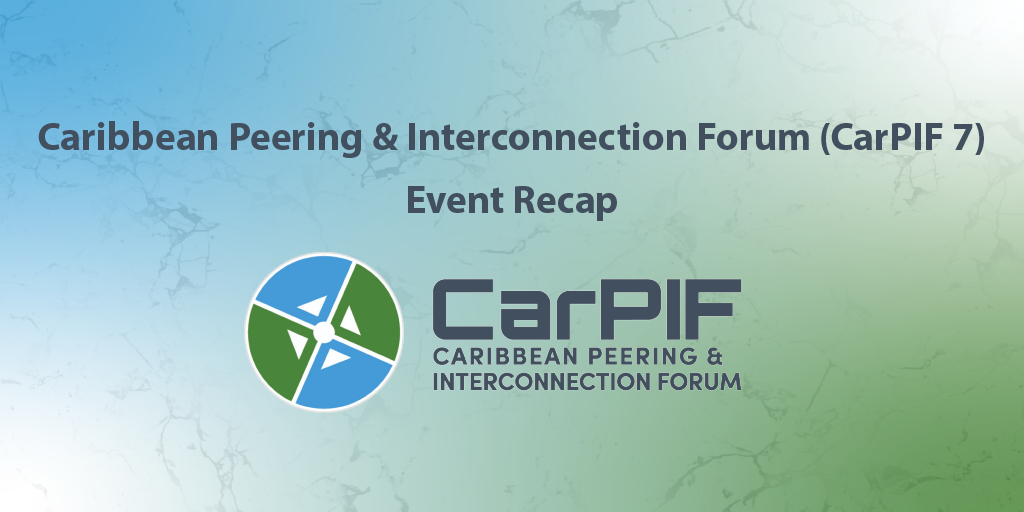
CARPIF 7 - Securing Our Caribbean Connections
Update on the 7th Caribbean Peering and Interconnection Forum
After more than a year of public health and safety restrictions, the COVID-19 pandemic has reframed and reprioritized discussions in the Caribbean concerning Internet connectivity, peering and digital services. A new wave of Internet users has been driven online by the closure of schools, offices and borders. Work from home arrangements have triggered more connected devices, from tablets, laptops, and desktop computers to fitness wearables, smart speakers, and security equipment, amongst others. And more digital content is being produced to meet the need to urgently migrate traditionally paper-based or manual services online.
The confluence of factors has resulted in a surge in demand for mobile and fixed broadband services and a cry for improved quality of service. It also opened the door to new opportunities as well as increased cyberthreats. This is the backdrop against which the seventh annual Caribbean Peering & Interconnection Forum (CarPIF 7) was staged on 7 July 2021.
CarPIF provides a truly unique opportunity where individuals in this diverse group get to connect with peers and industry colleagues to build relationships, share experiences and shape the development of the Internet in the Caribbean. This year, a half-day virtual event facilitated timely discussions on a number of issues critical to peering and interconnection in the Caribbean.
The meeting opened with an overview of CarPIF and the issues facing Internet development in the Caribbean. Shernon Osepa, Director of Caribbean Affairs of ISOC; Stephen Lee, CaribNOG Program Director; Junior Mc Intyre, ICT Consultant at the CTU, Albert Daniels, Senior Manager, Stakeholder Engagement, the Caribbean at ICANN, and Kevon Swift, Head of Strategic Relations and Integration at LACNIC followed with welcome remarks from their organizations.
The first Feature Address of the day was presented by Bijal Sanghani, Director PeeringDB Board and Managing Director of Euro-IX. In her presentation, titled Global Visibility for Local Internet Exchange Points (IXPs), Ms. Sanghani spoke in depth about the work that Euro-IX focuses on and why it is so important for IXPs to be visible in global peering databases. She highlighted the policies and practices that best facilitate the growth of local IXPs and how up-to-date reporting, governance structures and outreach initiatives can provide better traffic localization and new interconnection opportunities.
The Panel discussion, Peering through the Pandemic: Experiences from Around the World, followed, building on the Feature Address. Nico Scheper of Amsterdam Internet Exchange (AMS-IX Caribbean); Gabriel Adonaylo of the Latin American and Caribbean Association of Internet Exchange Point Operators (LAC-IX); and Nishal Goburdhan of Packet Clearing House and Peering Coordinator for the Johannesburg Internet Exchange Point presented, while Claire Craig of The University of the West Indies, moderated the session. These Internet interconnection experts representing the Caribbean, Latin America and Africa shared how Internet traffic and local content trends at IXPs in different regions are being impacted by pandemic.
Participants were then treated to a video presentation on CarPIF over the years, highlighting quotes and candid moments from CarPIF gatherings from its inception to the present time. The meeting then shifted gears to the first of the two training sessions on the agenda. Israel Rosas, Senior Development Manager of Latin America and the Caribbean at the Internet Society (ISOC) spoke in-depth about routing security during his two-part presentation. He first walked us through Border Gateway Protocol (BGP) incidents in the Caribbean and how the results are often more than just inconvenient routing incidents. In his second presentation, Mind Your MANRS – Achieving Routing Resilience What You Need to Know, What You Need to Do, Mr. Rosas shared on Mutually Agreed Norms for Routing Security (MANRS), a global initiative that provides crucial fixes to reduce the most common routing threats.
The second Feature Address, presented by Abdul-Hakeem Ajijola of the Global Commission on the Stability of Cyberspace, focused on network security. In his presentation, Small Networks, Big Problems, a CSO Guide to Securing Networks, Mr. Ajijola discussed practical guidelines for security teams to remain flexible and relevant as they keep networks and organizations secure. He placed strong emphasis on the importance of local networks and solutions.
The final hands-on training session was facilitated by Patrick Okui, a network engineer and trainer at Network Startup Resource Center (NSRC). In his presentation, Mr. Okui provided IX operators with a checklist of tools, techniques, and strategies for designing and managing critical internet infrastructure.
Mr. Swift moderated a two-part update session with CarPIF members. First, Junior McIntyre of the CTU shared about the upcoming CaribIX Project to establish IXPs in the French Caribbean. Next, Jai Udit, Lead Officer Research and Innovation Unit at the Suriname telecoms regulator, discussed the status of the Suriname Internet Exchange (SUR-IX) project as it nears operational readiness.
The event closed with an open-mic session and insightful perspectives shared by the event organizers, including Mr. Swift, Mr. Lee, Mr. McIntyre, Mr. Daniels, Mr. Osepa and Mr. Wooding.
Without a doubt, this was one of the most significant CarPIF gatherings. Special thanks to all the attendees, partners and sponsors who together helped make CarPIF 7 an unqualified success. The theme for CarPIF 7, “Strengthening and Securing Caribbean Connectivity,” resonated throughout the proceedings. It was also reflected in the list of organizations collaborating to make CarPIF possible. Organizers included co-hosts, the Caribbean Network Operators Group (CaribNOG), the American Registry for Internet Numbers (ARIN), Internet Society (ISOC) and Latin America and Caribbean Network Information Centre (LACNIC). These organizations, together with the Caribbean Telecommunications Union, the Internet Corporation for Assigned Names and Numbers (ICANN) and Packet Clearing House (PCH) have supported CarPIF from its inception in Barbados in 2015.
Based on the rich interactions and strong participation from across the Caribbean and beyond, it is clear that CarPIF has grown into so much more than just an event. It is now a growing and dedicated community representing telecom operators, Internet service providers, content owners and providers, regulators, data center operators, government officials, academics and other stakeholders, from over 20 nations and territories.
The forum has again provided a truly unique opportunity for individuals to connect with peers and industry colleagues and to build relationships, share experiences and shape the development of the Internet in the Caribbean. ARIN looks forward to continued collaboration with our partners and community in the region to strengthen and secure Caribbean connections.
Recent blogs categorized under: Caribbean
GET THE LATEST!
Sign up to receive the latest news about ARIN and the most pressing issues facing the Internet community.
SIGN ME UP →Blog Categories
ARIN Bits • Tips • Updates • Elections • Caribbean • Outreach • Security • RPKI • Public Policy • Guest Post • Grant Program • Fellowship Program • Data Accuracy • IPv6 • Business Case for IPv6 • Internet Governance • Training • IPv4 • Customer Feedback • IRR



